The Democratic Republic of the Congo is experiencing a critical juncture as it seeks the withdrawal of the UN peacekeeping force MONUSCO amidst rising violence from regional armed groups like the M23. While many locals demand the departure of peacekeepers due to their perceived ineffectiveness, the potential security vacuum raises concerns over the safety of millions of displaced individuals in a conflict-fueled landscape intensified by international interests in local minerals.
The Democratic Republic of the Congo (DRC) is grappling with immense challenges as it seeks the withdrawal of the United Nations peacekeeping force, MONUSCO, tasked with stabilizing the mineral-rich eastern region. Despite a long-standing UN presence, a surge in violence, particularly from various armed groups including the M23 militia, has created a precarious security situation for civilians. Political frustrations have galvanized public sentiment against the peacekeepers, prompting calls for their departure despite the potential risks to millions of displaced populations.
During a recent patrol with MONUSCO, the pervasive instability became evident in towns like Sake, where residents have fled due to ongoing conflicts. The M23 rebel group, allegedly supported by Rwanda, leverages significant military aggressions against both government forces and local armies. Despite a temporary ceasefire mediated by the United States and Angola, tensions remain high, underscoring the volatility of the region’s security dynamics.
Discontent towards MONUSCO has been palpable, with many Congolese citizens expressing anger over the peacekeepers’ lack of effectiveness in protecting civilians from escalating violence. Various protests against the UN forces reflect a broader dissatisfaction that culminated in a push for a phased withdrawal earlier this year, a process now threatened by persistent unrest and renewed assaults from armed factions.
The underlying resource wealth of the DRC, particularly in cobalt and tantalum, adds complexity to the conflict. As these minerals are essential to global technological markets, external interests complicate local governance and security efforts. Increased scrutiny of Rwanda’s role in the conflict and allegations of resource exploitation further highlights the intricate web of motivations driving the strife in eastern DRC.
As the DRC government revisits the timeline for MONUSCO’s exit, the essential need for a concerted plan to fill the imminent security void becomes critical. International stakeholders have raised alarms about potential repercussions on the humanitarian situation, particularly given that over 80% of the DRC’s displaced population resides in areas under UN protection. Without a sustainable strategy, the exiting peacekeepers could inadvertently exacerbate the already dire circumstances facing millions of people displaced by conflict.
The Democratic Republic of the Congo is a nation rich in mineral resources, making it a focal point in global economic interests, particularly due to its cobalt production essential for modern technology. The presence of armed groups, notably the M23, creates instability and violence, posing significant threats to civilian populations. The UN peacekeeping operation, MONUSCO, has operated in the region for over two decades, providing security and humanitarian support. However, growing discontent among the population regarding the effectiveness of the peacekeepers has led to calls for their withdrawal, despite fears of a security vacuum following their departure. The historical context of external influences, particularly from Rwanda in supporting local militia actions, further complicates the ongoing conflict and dynamics in the region.
The situation in the DRC remains alarming as the call for the UN peacekeepers’ withdrawal poses a double-edged sword, balancing local frustrations against the potential for deeper chaos. The entangled interests of external parties and local militias in the region’s lucrative mineral wealth amplify the complexity of achieving peace and stability. While the DRC government seeks to reclaim control and security, there is an urgent need for comprehensive planning to ensure civilians are protected from the ravages of conflict in the face of impending UN troop reductions. The resolution of this multifaceted crisis will require concerted efforts from international actors, the Congolese government, and local communities to avoid a catastrophic deterioration of the security situation.
Original Source: www.voanews.com






